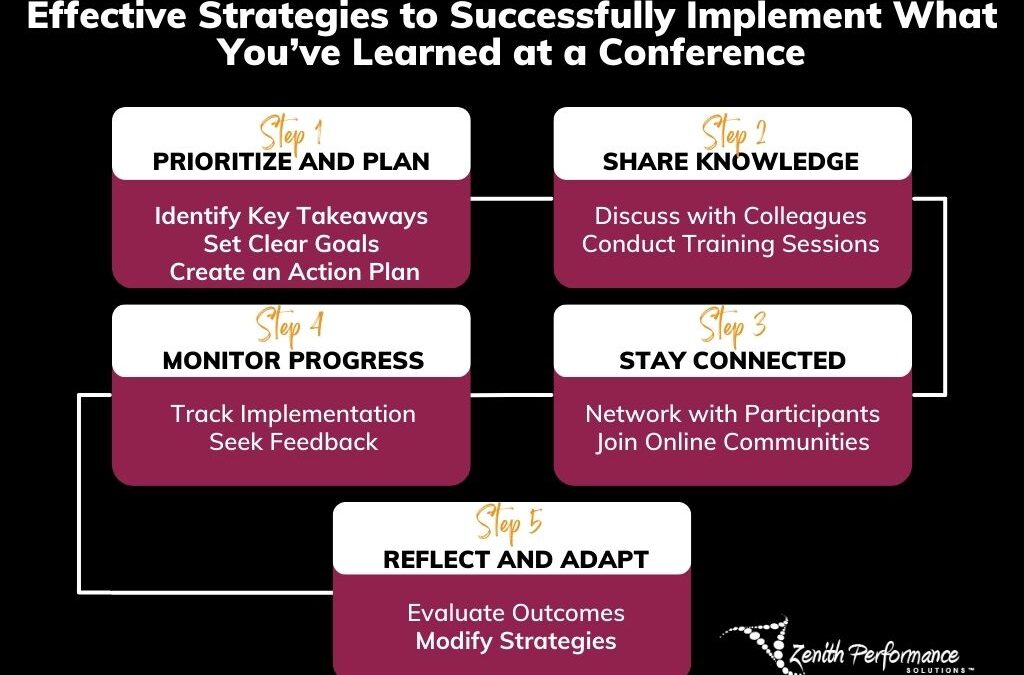Attending a conference can be a fantastic experience, filled with new insights, knowledge, and connections. However, once the conference is over, and the excitement fades, you find yourself struggling to implement the learned strategies into your daily routines.
This post-conference high is often followed by a period of inertia, where the motivation to act on the acquired knowledge is lost.
I attended and presented at TechLearn last week and I know that many of you will be heading to DevLearn in October, so to help you overcome this, here are some effective strategies to ensure that you can successfully implement what you’ve learned at a conference.
1. Prioritize and Plan:
a. Identify Key Takeaways:
· Block time in your calendar to review your notes and identify how you will implement what you learned.
· List out the most important points, insights, or strategies you learned.
· Prioritize them based on their relevance and impact on your work or life.
b. Set Clear Goals:
· Define what you want to achieve by implementing the learned strategies.
· Break the goals into smaller, manageable tasks and set deadlines for each.
c. Create an Action Plan:
· Develop a step-by-step plan detailing how you will achieve each task.
· Allocate time and resources needed to execute the plan.
2. Share Knowledge:
a. Discuss with Colleagues:
· Share your insights and learnings with your peers and team members.
· Encourage discussions and brainstorming sessions to explore how the new knowledge can be applied.
b. Conduct Training Sessions:
· Organize workshops or training sessions to disseminate the acquired knowledge.
· Encourage participation and seek feedback to refine the implementation process.
3. Stay Connected:
a. Network with Participants:
· Keep in touch with the people you met at the conference.
· Exchange ideas, seek advice, and collaborate on projects.
b. Join Online Communities:
· Participate in forums, social media groups, or other online communities related to the conference topics.
· Share your experiences, ask questions, and learn from others.
4. Monitor Progress:
a. Track Implementation:
· Physically block out time in your calendar, maybe one hour a week, to implement your goals. Being intentional is important, but setting aside time for your intentions is even more important.
· Regularly review the progress of the tasks and goals you’ve set.
· Adjust your action plan as needed, based on the results and feedback.
b. Seek Feedback:
· Collect feedback from peers, subordinates, and superiors on the effectiveness of the implemented strategies.
· Use the feedback to make continuous improvements.
5. Reflect and Adapt:
a. Evaluate Outcomes:
· Assess the impact of the implemented strategies on your work or life.
· Determine whether the desired outcomes have been achieved.
b. Modify Strategies:
· Based on the evaluation, modify, or adapt the strategies as necessary.
· Continue to learn and evolve to ensure sustained growth and development.
The post-conference high can be a powerful catalyst for change and improvement if harnessed correctly. By prioritizing and planning, sharing knowledge, staying connected, monitoring progress, and reflecting and adapting, you can ensure that the insights and strategies learned at a conference are effectively implemented. Remember, the key is to act promptly and stay committed to your goals, allowing the newfound knowledge to fuel your journey towards success.

